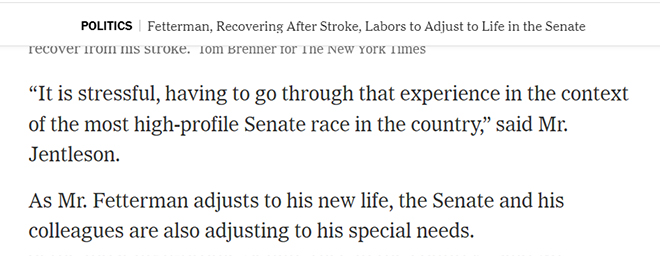NYT Article On John Fetterman’s Health and ‘Special Needs’ in Congress Gets Edited After Backlash

AP Photo/Carolyn Kaster
A New York Times article about recently hospitalized first-term Democrat Sen. John Fetterman became a trending topic on Friday, and was altered after publication following some objections to its phrasing and framing.
Fetterman’s stroke and subsequent medical issues were a point of contention throughout his campaign in 2022, facing Republican candidate Dr. Mehmet Oz for the seat vacated by now-retired Republican Sen. Pat Toomey.
Questions about Fetterman dealing with the rigors of the campaign or the job of Senator were raised by Republicans during the campaign. When challenges that the Democrat faced were brought up in the media there was widespread outrage and fury, but most outlets were able to dodge negative feedback by treating the issue as not an issue at all.
The Senator was hospitalized this week after experiencing lightheadedness, but doctors determined there were no signs of another stroke.
The New York Times published an article on Friday about the challenges faced by Fetterman as a Senator.

In it, correspondent Annie Karni covered what aides described to her as a “difficult period” of adjustment in taking office.
“The latest health scare convinced his staff that Mr. Fetterman needs a better plan to take care of himself, both physically and emotionally,” Karni reported.
The article details some of the changes made to his desk in the Senate, such as a monitor “that rises or lowers, depending on whether he sits or stands, and provides closed captioning so he can follow the proceedings,” and “live audio-to-text transcription” of the committees on which the Senator serves.
But his adjustment to serving in the Senate has been made vastly more difficult by the strains of his recovery, which left him with a physical impairment and serious mental health challenges that have rendered the transition extraordinarily challenging — even with the accommodations that have been made to help him adapt.
Fetterman declined to be interviewed for the article, but Karni reported that “aides and confidantes” of the senator revealed the “difficult” adjustment to his new role has been “filled with unfamiliar duties that are taxing for someone still in recovery: meetings with constituents, attending caucus and committee meetings, appearing in public at White House events” and other activities.
Karni emphasized that with a sympathetic view, stressing that those around him worry for his sake.
“He has had to come to terms with the fact that he may have set himself back permanently by not taking the recommended amount of rest during the campaign,” reads the report. “And he continues to push himself in ways that people close to him worry are detrimental.”
The article then transitioned to Fetterman’s colleagues, with a segue that stood out among many objections on social media.

“As Mr. Fetterman adjusts to his new life, the Senate and his colleagues are also adjusting to his special needs,” it originally said, before covering comments from Sen. Amy Klobuchar.
“Special needs” was later changed after a fair amount of online backlash, including from writer Sara Luterman.
Wow, I hate this. FYI @nytimes, @JohnFetterman’s needs are not “special.” pic.twitter.com/tqa7wi6KYY
— Sara Luterman (@slooterman) February 10, 2023
I use captions every day at work. If somebody called me “special needs” I would go to HR.
— Sara Luterman (@slooterman) February 10, 2023
The article has been changed and now reads, “the Senate and his colleagues are also adjusting to his needs.”
Update: “Special needs” has been removed. Thank you for making the correction, @nytimes. I’m still kind of shocked it made it through in the first place. https://t.co/mM9umZMchu
— Sara Luterman (@slooterman) February 10, 2023
Other critics have expressed frustration that details regarding those needs and Fetterman’s limitations are coming “too late” — as in, after the election.
Here comes the truth about John Fetterman, in today’s New York Times – months too late:
“When it’s bad, Mr. Fetterman has described it as trying to make out the muffled voice of the teacher in the ‘Peanuts’ cartoon, whose words could never be deciphered.”https://t.co/UEjGpnuM59
— Steve Krakauer (@SteveKrak) February 10, 2023
Also of note in the story, which former CNN journalist Chris Cillizza referred to as “a wow” in a tweet on Friday, are details about how the senator no longer spends time interacting with journalists, and is unable to participate in hallway interview scrums due to his “technological” needs.
The article is both careful in presentation and extensive in noting and quoting on the subject of adjusting to disabilities and particular requirements in Congress, though it still faces a good deal of backlash from both political sides.
Read the full New York Times article here.
Correction: This story has been updated to note that Chris Cillizza is no longer with CNN.
New: The Mediaite One-Sheet "Newsletter of Newsletters"
Your daily summary and analysis of what the many, many media newsletters are saying and reporting. Subscribe now!






Comments
↓ Scroll down for comments ↓